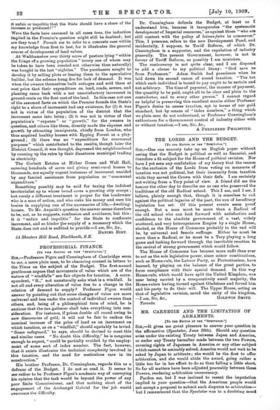THE LORDS AND THE BUDGET.
ITo THR EDITOR Or THB "SPICTATOft."1
SIR,—One can scarcely take up an English paper without seeing that the Budget is political as well as financial, and therefore a fit subject for the House of political revision. Nor have I yet seen any confutation of my theory that the reason for the exclusion of the Lords from voting on measures of taxation was not political, but their immunity from taxation while they served the Crown with their fiefs. I am certainly not writing from a Tory point of view. A friend did me the honour the other day to describe me as one who preserved the traditions of the old Radical school. This I am, and I see, I believe, plainly enough that, though it is senseless to rail against the political legacies of the past, the sun of hereditary legislation has set. Of this present events seem proof enough. But a man must be more than a Radical of the old school who can look forward with satisfaction and confidence to the absolute government of a vast, widely scattered, and very heterogeneous Empire by a single House, elected, as the House of Commons probably in the end will be, by universal and female suffrage. Either he must be more than a Radical, or he must be a Tory playing a long game and looking forward through the inevitable reaction to the revival of strong government which would follow.
The House of Commons has become more unfit than ever to act as the sole legislative power, since minor combinations, such as Home-rule, the Labour Party, or Protectionism, have learned, by playing on the balance of the great parties, to force compliance with their special demand. In this way Home-rule, which would have split the United Kingdom, was near being carried by a comparatively small majority, the Home-rulers having turned against Gladstone and forced him and his party to do their will. The Upper House, acting as that of legislative revision, saved the unity of the kingdom.










































 Previous page
Previous page